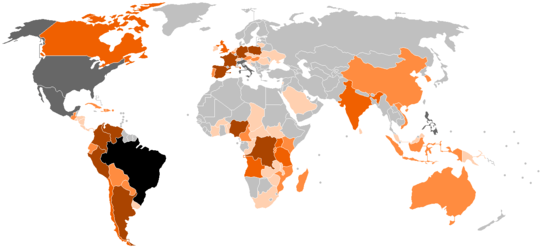Catholic Church in Kiribati
The Catholic Church in Kiribati is part of the worldwide Catholic Church, which, inspired by the life, death and teachings of Jesus Christ, and under the spiritual leadership of the Pope and Roman curia in the Vatican City (within Rome) is the largest Christian church in the world. Bishop Paul Eusebius Mea Kaiuea is Bishop of Tarawa-Nauru, Kiribati.
Demography
Kiribati is predominantly Christian with a population estimated at 98,989 in 2009, of which 55% were Roman Catholic, and Kiribati Protestant were 36%.[1]
History
Lying halfway between Hawaii and Australia, Kiribati consists of 32 low-lying atolls and one raised island located within a vast expanse of ocean comprising three main groupings: the Gilbert Islands, Phoenix Islands, and Line Islands. The original inhabitants of Kiribati are a Micronesian people who arrived between 1000 and 1300 AD. Invasions by Fijians and Tongans later brought Melanesian and Polynesian influence. European contact began in the 16th century and in 1892, the Gilbert and Ellice Islands (now Tuvalu) became British protectorates. A British colony from 1916, and scene of bitter fighting during World War II, Kiribati became an independent nation in 1978.[2]
Upon the partition of the Vicariate of Micronesia, the Gilbert Islands were created as a separate vicariate by the Catholic Church in 1897. Mgr. Joseph Leray was placed at its head and, with several missionary priests from the Missionaries of the Sacred Heart, he began missionary work in the islands.[3] In 1966, the Vicariate was elevated to become the Diocese of Tarawa. In 1978, the name changed to Diocese of Tarawa, Nauru and Funafuti. This was split in 1982 into the Mission "Sui Iuris" of Funafuti and the Diocese of Tarawa and Nauru.[4] Bishop Paul Eusebius Mea Kaiuea, M.S.C. was ordained Bishop of Tarawa, Nauru and Funafuti, Kiribati in 1979.[5] The Sacred Heart Catholic Cathedral is located in South Tarawa, Kiribati.[6]
The Constitution of Kiribati provides for freedom of religion. It is a predominantly Christian nation today, with around 55% of the population being Catholic. The Christian festivals of Christmas, Easter, and National Gospel Day are official religious holidays.[7]
See also
- Roman Catholic Diocese of Tarawa and Nauru
- Roman Catholic Mission Sui Iuris of Funafuti
- Roman Catholic Archdiocese of Suva
References
- ↑ http://www.state.gov/r/pa/ei/bgn/1836.htm
- ↑ http://www.state.gov/g/drl/rls/irf/2007/90139.htm
- ↑ http://www.newadvent.org/cathen/06557a.htm
- ↑ "Diocese of Tarawa and Nauru". Catholic-Hierarchy.org. David M. Cheney. Retrieved 21 January 2015.
- ↑ "Bishop Paul Eusebius Mea Kaiuea, M.S.C.". Catholic-Hierarchy.org. David M. Cheney. Retrieved 21 January 2015.
- ↑ http://www.gcatholic.org/churches/data/cathASX.htm
- ↑ http://www.state.gov/r/pa/ei/bgn/1836.htm

